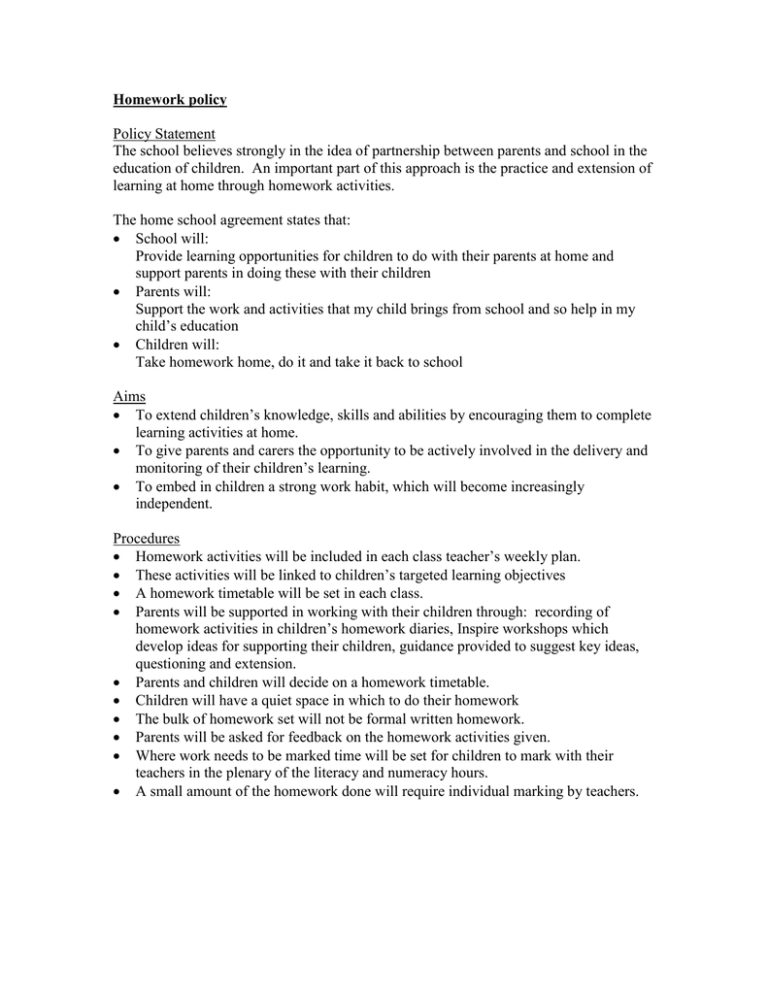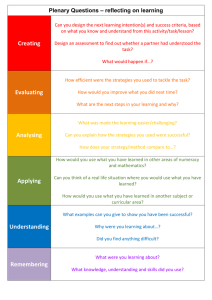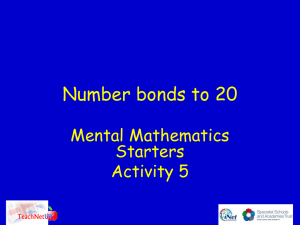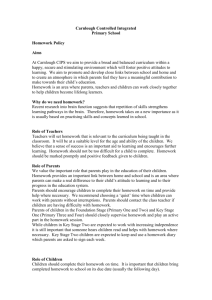Homework policy
advertisement

Homework policy Policy Statement The school believes strongly in the idea of partnership between parents and school in the education of children. An important part of this approach is the practice and extension of learning at home through homework activities. The home school agreement states that: School will: Provide learning opportunities for children to do with their parents at home and support parents in doing these with their children Parents will: Support the work and activities that my child brings from school and so help in my child’s education Children will: Take homework home, do it and take it back to school Aims To extend children’s knowledge, skills and abilities by encouraging them to complete learning activities at home. To give parents and carers the opportunity to be actively involved in the delivery and monitoring of their children’s learning. To embed in children a strong work habit, which will become increasingly independent. Procedures Homework activities will be included in each class teacher’s weekly plan. These activities will be linked to children’s targeted learning objectives A homework timetable will be set in each class. Parents will be supported in working with their children through: recording of homework activities in children’s homework diaries, Inspire workshops which develop ideas for supporting their children, guidance provided to suggest key ideas, questioning and extension. Parents and children will decide on a homework timetable. Children will have a quiet space in which to do their homework The bulk of homework set will not be formal written homework. Parents will be asked for feedback on the homework activities given. Where work needs to be marked time will be set for children to mark with their teachers in the plenary of the literacy and numeracy hours. A small amount of the homework done will require individual marking by teachers. Principles Particularly in the case of young children, it is the involvement of parents / carers in joint activities, which can be very brief, which is most valuable in children’s learning. Together we must identify those ideas and skills, which, if they were practiced at home, would help children the most. By far the most important of these are reading with good understanding. Others are the building blocks of literacy and Numeracy i.e. number bonds / tables / spellings. The person who is reading with the child can then discuss the book and ask questions about it to develop the child’s understanding. Children with Special Education Needs require an approach, which balances the need for them to do as much in common with other children as possible while attending to those targets which enable them to be successful. Time devoted to the development of a bank of effective homework activities will benefit the children in guided practice and will benefit the school by having children with deeply embedded key concepts and skills. Homework must not get in the way of or prevent other beneficial activities that the children will be involved in at home. Effective homework depends on commitment from school, parents and pupils. The management of homework must be dovetailed into current teaching practices. It: Will be included in weekly planning. Set during the plenary of the given lesson Will complete work done in the previous session or contribute to the work done in the next session Can, where appropriate, be marked as a class / group. Homework will be a successful contribution to children’s learning, when it is overtly valued by the school and the parents. Monitoring and Evaluating Each half term key stage co-ordinators will analyse and check a sample of homework diaries and activities to ascertain that: Homework is being set according to the homework map. The volume of homework is appropriate to the year group and individuals Appropriate marking strategies are being adopted. The resultant workload is manageable. They will evaluate the provision of homework to: Gauge its impact on learning and teaching. Identify and share exemplar practice. Suggest appropriate amendments to the policy. Class YR Minutes Each Week 50 Y1 75 Y2 75 Y3 100 Y4 125 Y5 150 Y6 150 Mon Wed Thurs Sharing a reading book. When it is appropriate, practical mathematics activities will be suggested. Sharing a reading book. When it is appropriate, practical mathematics activities will be suggested. Sharing a book. Tues Fri Instant recall of number facts Spelling Instant Sharing a reading book. recall of number facts Reading practice followed by questions from an adult or older child. Learn times tables / number bonds as directed by maths set teacher. Occasional written mathematics homework set by sets teacher. One piece of formal written work to be given as follow up literacy group work with class teacher (on the child’s group work day). Spellings on a Friday. Reading practice followed by questions from an adult or older child. One piece of formal written homework for English / other area. Learn times tables / number bonds as directed by maths set teacher. At least one piece of formal written mathematics homework set in sets. Immediate Actions: Sets teachers to set up baskets / boxes to be put in classes to receive Homework. Teachers to provide children with Homework Timetables. Children in Key Stage 2 to be provided with Homework Folders (envelope files) Teachers to include Homework in their weekly planning. Co-ordinators to identify current resources that can be used as teacher friendly homework resources. Co-ordinators to buy in appropriate additional resources. Parents to use targets to identify further opportunities – ideas from INSPIRE workshops.


